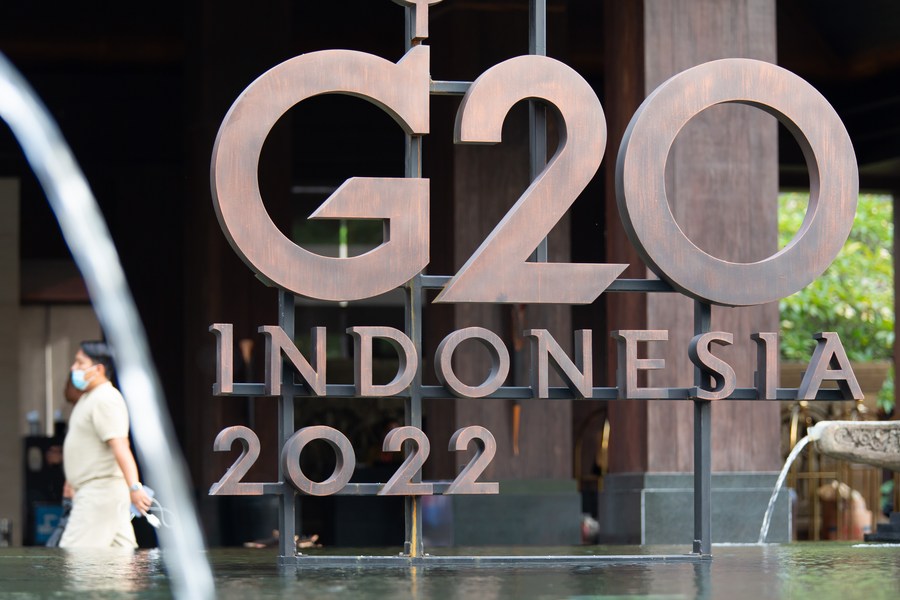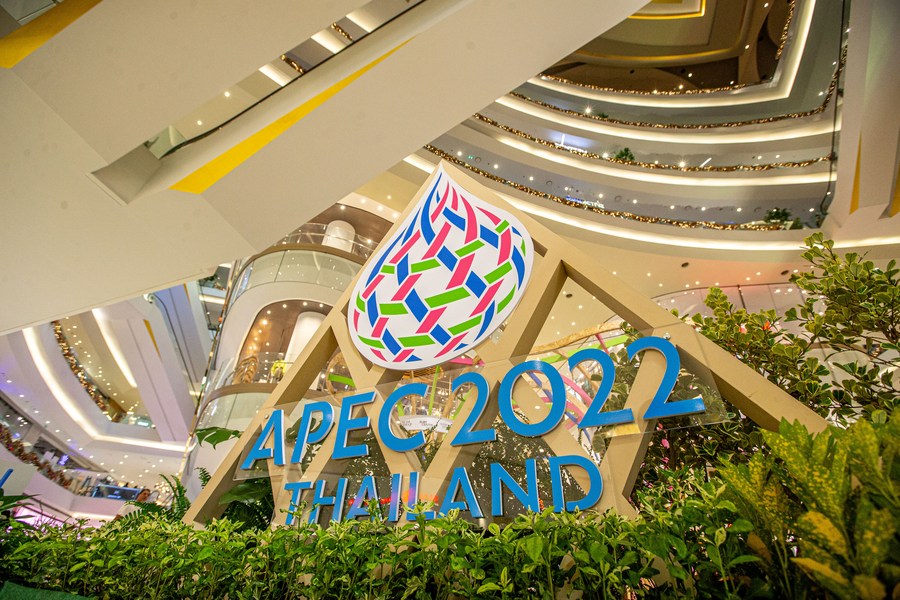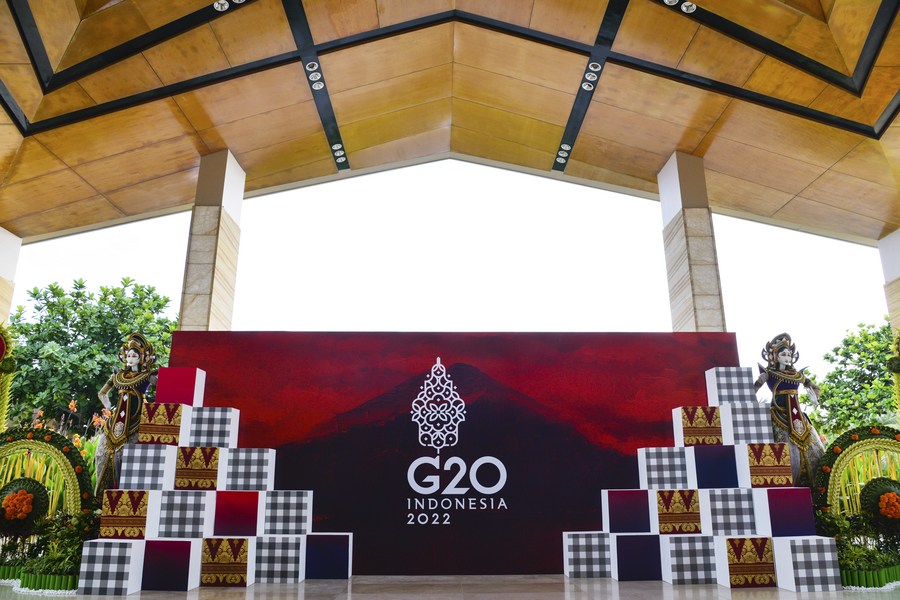Xinhua Commentary: Right choices, concrete actions in dire need for a better world

This photo taken on Nov. 12, 2022 shows the logo for the 17th Group of 20 (G20) Summit outside Apurva Kempinski, the main venue for the summit in Bali, Indonesia. (Xinhua/Wang Yiliang)
To spur common development, all major countries should perform their due responsibilities by sincerely helping others develop and providing more global public goods. Beggar-thy-neighbor practices, or the adoption of "small-yard, high-fence" strategies should not be an option.
BEIJING, Nov. 20 (Xinhua) -- As world leaders gathered in Asia in the past week for two back-to-back major multilateral meetings, one thing was clear: they were willing to sit down together to search for ways to address many of the world's most pressing challenges although differences remain.
Prior to the Group of 20 (G20) summit which was held on Tuesday and Wednesday on the Indonesian resort island of Bali, there was some pessimistic talk that obstacles could be too overwhelming to establish consensus. After all, the summit came against the backdrop of a slew of agonizing global crises, including a lackluster world economy, rising geopolitical rivalries and a warming planet.
As commitment to peace and openness was renewed and pledges were made to foster a stronger recovery and sustainable development at the G20 summit and the ensuing Asia-Pacific Economic Cooperation (APEC) Economic Leaders' Meeting in Bangkok, the global community can actually find some comfort that tough yet imperative choices have been made for the sake of humanity's shared future.

A logo of APEC 2022 is pictured in Bangkok, Thailand, Nov. 16, 2022. (Xinhua/Wang Teng)
In Bali, G20 leaders vowed to uphold international law and the multilateral system safeguarding peace and stability, and agreed on the importance of peaceful resolution of conflicts, diplomacy and dialogue.
They pledged to take action to promote food and energy security and support stability of markets, and continue enhancing macro policy cooperation and guarding against downside risks and negative spillovers; they also agreed to support developing countries, particularly the least developed and small island developing states, and vowed to strengthen full and effective implementation of the Paris Agreement and its temperature goal.
The APEC meeting also highlighted close cooperation to stimulate strong, balanced, secure, sustainable and inclusive growth, as well as a commitment to realizing the APEC Putrajaya Vision of building an open, dynamic, resilient and peaceful Asia-Pacific community by 2040.
It's also worth noting that in Bali, Chinese President Xi Jinping and his U.S. counterpart, Joe Biden held a candid, in-depth, constructive and strategic meeting, in which the two heads of state discussed major issues concerning bilateral ties and the prospects for world peace and development.
While Dr. Henry Kissinger described the Xi-Biden summit as "bridge-building," others worldwide believe that the effort was conducive to bringing China-U.S. relations back on track and was a boon to the world.
Due to Washington's provocative policies as well as bullying tactics, the world's arguably most important bilateral relationship has suffered a downward spiral in the past years and is at a low ebb in decades. That has put the world on tenterhooks given the global repercussions of growing hostilities between the top two world economies.
Commenting on the Xi-Biden meeting, Ani Dasgupta, president of the World Resources Institute, said "the global community is breathing a sigh of relief."
The crucial consensuses reached either inside the G20 and APEC conference halls or on the sidelines adumbrate a new era of unprecedented transformations in the world, as Xi pointed out in his G20 summit speech, "We meet at a time of momentous changes unseen in a century."

This photo taken on Nov. 11, 2022 shows logos and decorations for the 17th Group of 20 (G20) Summit outside a venue for the summit in Bali, Indonesia. (Xinhua/Xu Qin)
The most prominent feature of this age is that the fate of all nations is closely linked. They rise or fall together.
That is why a vision of common, comprehensive, cooperative and sustainable security should be advocated and embraced by all.
To achieve such a vision, the you-win-I-lose Cold-War thinking should be abandoned first. If some countries fail to wean themselves off the addiction to pursuing absolute security at the expense of others by stirring up ideological confrontation, the world would only end up a more dangerous place.
And development is real only when all countries develop together. Prosperity and stability cannot be possible in a world where the rich become richer while the poor are made poorer.
That is why the world needs to jointly remodel global development, rendering it more inclusive, beneficial to all, and more resilient.
To spur common development, all major countries should perform their due responsibilities by sincerely helping others develop and providing more global public goods. Beggar-thy-neighbor practices, or the adoption of "small-yard, high-fence" strategies should not be an option.
As the G20 encompasses almost all major economies across the globe, and the APEC represents the world's most dynamic economic powerhouse, their message of replacing division with unity, and confrontation with cooperation matters so much for an anxious world.
As the whirlwind of global diplomacy of the past days has just concluded, the cause to make this world a better place for all has a long way to go.
In the same spirit, climate negotiators from around the globe who are attending the UN climate conference in Egypt have agreed to create a special fund to compensate the damage caused by climate change in poorer countries, a breakthrough on curbing global warming.
The world of course has a good reason to cheer and be optimistic. However, making the right choices are only a first step. Concrete actions must be taken.


